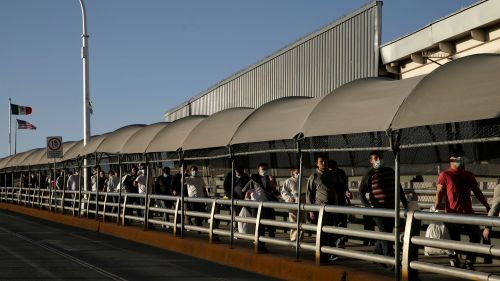Vulnerable, Vilified, and Essential: Immigrants, Refugees, and Asylum-Seekers during COVID-19

How did President Donald Trump's 2020 suspension of the issuance of green cards for people outside of the United States due to the COVID-19 pandemic affect immigrants?
April 22 Executive Order
Donald Trump’s executive order on immigration, issued on April 22, 2020 suspends for 60 days the issuance of immigrant visas (green cards) for people outside the United States. The order is narrowly written. It does not affect spouses or children of US citizens, nor those in the US on temporary work visas – a category encompassing many of the workers now understood to be crucial to the continued functioning of the economy. The executive order also de facto acknowledges the key role of immigrants in combatting the pandemic, exempting those “seeking to enter the United States on an immigrant visa as a physician, nurse, or other healthcare professional; to perform medical research or other research intended to combat the spread of COVID-19; or to perform work essential to combating, recovering from, or otherwise alleviating the effects of the COVID-19 outbreak.”
Though narrow in scope, the executive order is but the latest of a long string of punitive and restrictionist measures the Trump administration has aimed at immigrants, refugees, and asylum seekers over the past three years. The purported rationale of the April 22 order—to decrease competition for scarce jobs—is flimsy at best. The order is essentially political theater, issued with the clear intention of signaling to Trump’s base his continued commitment to anti-immigrant rhetoric and policies.
With its carve-outs and limitations, the executive order may disappoint anti-immigration hardliners, while simultaneously alienating constituencies—like the Indian diaspora in the US—whose votes the president has so avidly courted. Like so many of this administration’s immigrant and refugee policies, the order will inflict needless pain, separating families without a meaningful economic or security rationale. There are indications that it will be followed up by more stringent measures. White House advisor Stephen Miller has hinted that the immigration ban will be extended beyond two months, and Section 6 of the order directs the Secretaries of Labor and Homeland Security to identify potential cuts to nonimmigrant visa programs.
The COVID-19 pandemic
The coronavirus pandemic is having an outsized impact on migrants, refugees, and asylum-seekers around the world. Disproportionally vulnerable to economic dislocation, and often at heightened risk of COVID-19 infection, non-citizens are further jeopardized by xenophobic rhetoric, stigmatization, and scapegoating. As jobs disappear and borders close, thousands of non-citizens find themselves stranded or sent back to dangerous locations. Like incarcerated populations, those in refugee camps and migrant detention facilities face dire consequences as the virus begins to spread through these crowded and confined settings. Several dozen migrants deported from the United States to Guatemala have tested positive for COVID-19. In effect, the United States is exporting the pandemic, further straining threadbare public health systems in Guatemala and other countries of origin.
The fates of newcomers and their host communities are intertwined. Recent reports from the Center for Migration Studies and the UC Davis Global Migration Center show that immigrants are proportionately more likely than native-born workers to be in jobs deemed to be essential.
Foreign-born medical workers and first responders, along with their non-immigrant coworkers, are among those risking everything to serve the public at a time of crisis. Thousands more migrants with healthcare training, but currently lacking proper authorization, could be deployed on an emergency basis to treat coronavirus patients. In recent weeks, a number of jurisdictions—including the states of New York, New Jersey, Nevada, and Massachusetts—have taken action to remove obstacles to the incorporation of foreign-trained specialists into the healthcare workforce.
In the United States, immigrants figure heavily in sectors suffering enormous job losses, including the gig economy, hospitality, housekeeping, caregiving, and construction. Undocumented immigrants who have lost their jobs do not qualify for the federal government’s emergency income supplements. Among immigrants still on the job, many are in parts of the workforce now acknowledged to be essential, working in grocery stores, meatpacking plants, distribution centers, produce farms, and as delivery drivers. Though the work may be essential, workplaces often lack adequate social distancing and other preventative measures—and many workers have neither paid sick leave nor health insurance—prompting a wave of recent wildcat strikes and health-related closures of food processing facilities.
Regardless of their legal status, or their role in the workforce, migrants are part of our communities. Both public health and economic recovery for all suffer when immigrants and mixed-status families are cut off from relief and recovery efforts. Leaders of an increasing number of U.S. cities and states have shown wisdom and compassion in taking a whole-of-society approach to survival and recovery.
On April 7, Chicago Mayor Lori Lightfoot issued an executive order opening the city’s emergency relief programs to all Chicagoans, regardless of citizenship or immigration status. California Governor Gavin Newsom has made it clear that immigrants will be able to access COVID-19 testing and treatment regardless of status. On April 15, Newsom announced a program to provide one-time cash payments to undocumented adults through a $125 million public-private partnership. These and other leaders understand that society cannot recover and rebuild without including migrants in policy solutions.
Spurred by migrant and refugee advocates, and public health professionals, far-sighted leaders around the world are taking actions to counter the scapegoating, exclusion, and endangerment of migrants and refugees. For example, in late March the government of Portugal granted temporary citizenship rights to all migrants with pending residency applications. Ruling on a suit brought by three migrant rights organizations, the Mexican federal court has ordered the release of that country’s detained migrants—the vast majority of which come from Central America. In the week following that April 15 court order more than two-thirds of detained migrants in Mexico were released (though some through deportation).
Immigrants are not only essential to the US economy but maintaining openness to newcomers is key to preserving our values and our national identity. The pandemic has laid bare societal fault lines and political-economic pathologies all over the world. The crisis shows that we’re literally all in this together. The post-pandemic future must be grounded in principles of solidarity and mutual aid. We must rebuild in ways that give voice and opportunity to the excluded and marginalized—among them people of color, workers, and the economically disadvantaged—as well as immigrants, refugees, and asylum-seekers.

